In their usual sloganeering fashion Abbott, Hockey, Cormann and others constantly refer to the ‘budget debt and deficit mess’ (or disaster) they inherited from Labor. In the post Resolving the budget ‘crisis’ I attempted to show that Labor left the budget in reasonably good shape. In so far as there is a mess or a crisis now, the author is Hockey and company.
From comments I may have not made the case plain. In what I hope is my last post on the budget of 2014, I lay out the case again, with additional information.
In the 2013 budget Wayne Swan went beyond the usual four-year projections to lay out expected receipts and payments over 10 years. He did this to reflect how the numbers would work out, given that the major payments for Gonski and NDIS did not cut in until after the four-year budget cycle. Swan left the budget in good fiscal shape.
When Bowen and Rudd took over from Swan/Gillard they had to rejig the budget to accommodate the early change from a fixed carbon price to carbon trading, plus some new policies. Labor’s legacy is reflected in the Pre-Election Fiscal Outlook (PEFO) prepared independently by Treasury and Finance and published under the charter of budget honesty in August 2013 before the last election is shown:
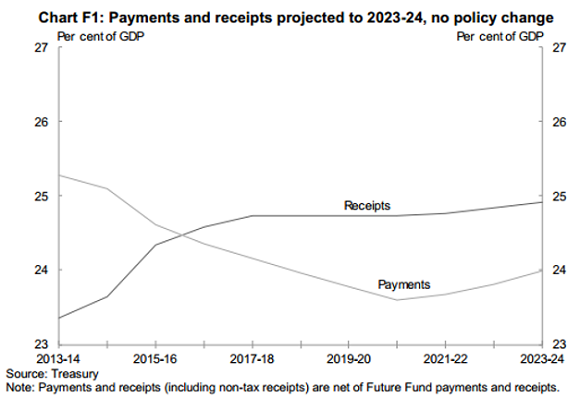
This graph has the budget back in surplus in 2015-16, an ongoing surplus of about 1% of GDP (about $16 billion) and a restoration of budget receipts to about 25% of GDP. The forecast assumed no tax cuts to offset bracket creep. In effect the government would take back some of the eight tax cuts delivered by Costello and the one delivered by Rudd.
Six years of Labor had seen debt increase through the unaffordable tax cuts and Keynesian stimulation to counter the GFC. Nevertheless debt was modest by international standards.
Here’s Labor’s debt in context:
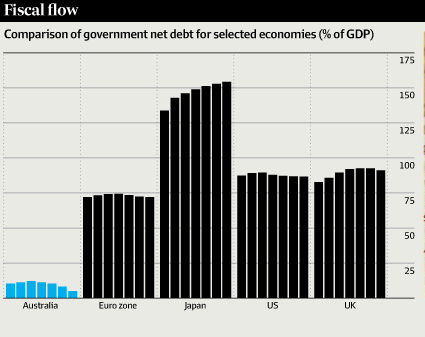
Hockey has done three main things.
First, he has added $68 billion in debt over the four-year budget cycle.
Second, he has delayed major cuts until the fourth year, as Ross Gittins has pointed out. (Ironically he has done this to stimulate the economy in transition from reliance on the resources boom. In fact consumer confidence tanked from the pre-budget talk of austerity and remains at levels of the 1991 recession.) Hence the budget does not reach surplus until 2016-17, one year later than Labor.
Third, Hockey has restrained receipts to 23.9% of GDP, according to Gittins, one election promise he has kept. Hockey has put the budget into a straight jacket entirely of his own making. This decision is based on his austerity/small government ideology.
The transition from Swan to Bowen to Hockey is reflected in this graph a form of which was published in the AFR at the time of the Mid-Year Forecast and Economic Outlook (MYEFO) last December.

Swan’s embarrassment and a fair bit of the negative view of Labor’s reputation as an economic manager is reflected in the difference between MYEFO for 2012 and the 2013 budget. Swan/Gillard had bravely forecast a budget surplus for 2012-13, but had to give up and defer for two years because of failing revenue. Treasury and Finance seemed to be completely blindsided by what was going on but the repeated failure of revenue to meet forecasts made the government look incompetent.
I understand revenue picked up a bit in the weeks before PEFO 2013, mainly due to better receipts from the mining and carbon taxes. I believe it was stable between PEFO 2013, Labor’s legacy, and MYEFO 2013, Hockey’s mess.
You will recall that the from ABC Factcheck confirmed Bowen’s contention that Hockey added $68 billion of debt to the forward estimates:

In the overall narrative the focus should be on what Hockey has done in increasing the deficit and in establishing a 23.9% of GDP limit on receipts. Instead we have sloganeering and a welter of numbers in an attempt to sheet home the entire blame to Labor. The LNP keeps saying that they gave us the budget the country needed and that there was no choice. There was choice in the overall budget framework as well as the allocations within it, which privileges the rich and the corporates and punished everyone else. Infrastructure and defence have also received increases, beyond normal inflation, though the former is limited to roads, neglecting public transport.
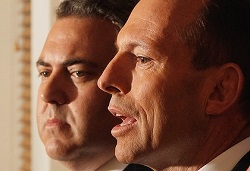
One sloganeering tactic is to state (true) that we are paying $1 billion in interest every month, and then rattle off what could be achieved with $12 billion extra in the budget. This entirely overlooks the need for debt to counter the GFC and the state we would have been in had we followed LNP policies.
Another is to say that if nothing were done then in 10 years the debt would be $667 billion pa. No economic commentator has had a good look at this claim, but it’s based on the Hockey mess, not Labor’s as such.
Based on that $667 number, they now have dazzled everyone with a ‘blizzard’, to borrow Bernard Keane’s description, of numbers derived from it. The interest bill becomes $2.8 billion per month, or $25,000 for each man, woman and child in the country, $100,000 for a family of four. Each Australian’s share of the interest would be $9,400 over the next 10 years, and so on and on.
Keane says it’s a Howard trick, although Howard had the gumption to stick to one number. Does anyone remember the ‘Beazley black hole’, the gigantic deficit left to the Howard government in 1996? This graph shows the budget balance history going back to when Howard was treasurer:
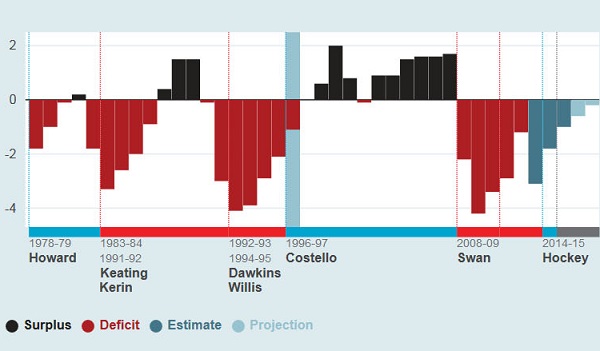
The graph is interactive. I’ve taken a screen shot with the blue marker bar over the socalled “Beazley black hole” It wasn’t a black hole and it wasn’t even Beazley’s as he was finance minister; Ralph Willis was treasurer. The deficit in that year was a benign 1.1% of GDP.
[This graph has replaced the less good one I had in the original post.]
The Tories have form, they specialise in lies. I’m inclined to think this present lot are liars, clunkheads or both, Laura Tingle’s assessment in 2010, and unfit for government.
Update: ABC FactCheck have done a thorough analysis of Hockey’s claim that
“At the moment we’re paying a billion dollars a month – one billion dollars every month in interest, in interest on the debt that Labor has left.”
Labor only incurred 75% of the current debt and there is a difference between gross debt and net debt. The verdict:
Using either gross debt or net debt, Mr Hockey’s claim that at the moment Australia is paying a billion dollars every month in interest on the debt that Labor left is exaggerated.
A nice way of saying he’s lying.
Previous posts on Budget 2014:
On a mission to upset everyone
Poll anger or a shift in the tectonic plates?
Cap super, says Richard Denniss
See also especially Hockey’s morality play.

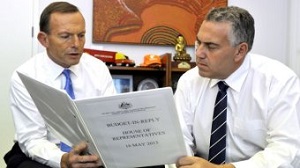
I realise that you have provided this long explanation in an attempt to avoid re-igniting old battles. And I accept that as you say Gillard and Swan looked silly. But a key difference in the Bowen Rudd approach you have actually mentioned was the decision to shift to a floating emissions price one year early, which I think, and thought at the time, was politically silly as well as being financially silly.
Labor in general, but I have to say I think Kevin Rudd was prone to this – have a way of responding to criticisms in such a way that it gives the criticisms more validity than they actually have. So – respond to criticisms of the “carbon tax” – silly ill-informed criticisms which should have been fiercely countered – by shifting to an emissions price one year early. Did they really think that people cared or even understood? All it did was lessen the receipts they would get.
I reckon left-wing people should just face it – sure Gillard and Swan didn’t make a good fist of the politics at times (over many issues) but they were facing a biased press, internal undermining and a whole lot of criticisms which were just rubbish.
Basically they did an ok job. Let’s just leave it at that. I think that by in any way rehashing the old internal Labor fights you risk weakening the critique of Abbott and Hockey.
All I see is economists getting forecasts wrong.
The same ones that didn’t see the GFC coming.
Ohh, and a special mention the the rating agencies too.
All just guesses into the never never with excuses built in.
Lucrative for some.
Val I agree with most of what you say.
Swan was a good fiscal manager and left things in good shape, given the quality of the information he was getting from Treasury and Finance. I was down on his early desire to achieve a surplus, which was unnecessary and gave his opponents a stick to beat him with. I didn’t like the fact that he signed off on the treatment of single mothers and several other decisions. Most of all he failed to do anything with the Henry report and squibbed tax reform after the schmozzle with the mining tax. Other than that he was a good treasurer and didn’t leave a mess.
I didn’t agree with Rudd about going early to carbon trading. It was politically unnecessary and just made the budget more difficult. It also detracted from his seriousness about climate change, I thought.
Well I agree with everything you’ve said there Brian. Not much to add really, except to lament the way even a treasurer like Swan – who did believe in social justice I think – has been captured by neo-liberalism.
One thing I give a lot of credit to Swan and Gillard for was raising the tax free thresh-hold to $18000. It was a simple move that significantly reduced the “claw-back” that people on benefits faced when they started working, and it would have benefited sole parents moving in to the workforce in particular. I do agree that shifting sole parents on to NewStart was very wrong, although as ever I also point out that the legislation was originally introduced by the Howard government. Not that that excuses Gillard and co for extending its reach though.
The strong advocacy by Gillard to increase the wages of low paid workers was another good move, and one that benefited low income women in particular.
That’s why I was so deeply disappointed by commentators like John Quiggin, so set on their denigration of Gillard, in particular, that they could not acknowledge these significant advances. I hold such commentators – who do have significant influence – partly responsible for the fact that we are now likely to lose a lot of these gains. People in general did not appreciate these gains because the narrative was taken over by contempt for Gillard et al – from both sides.
It’s like my relative who believes he was under-compensated for the carbon price because he doesn’t realise that the carbon price was only responsible for about ten per cent of the increase in electricity bills. Sure the government didn’t sell its measures very well, but there also weren’t influential third parties out there explaining how it all worked, because they were too busy bagging the government. Having worked in politics, I am very aware that having influential third parties on your side is important in getting your policies accepted – indeed, part of my job was to liaise with such people.
Anyway enough said, I guess the issue now as we agree, is that we have genuinely bad government and a manufactured ‘budget crisis’ (a local version of Naomi Klein’s shock doctrine thesis, as others have pointed out). So I return to my question of what is the best way to respond to the current government – to block supply or not? And if not, what? I want to write to MPs in the Greens and Labor but am not quite sure what to advocate.
Val,
Labor will never block supply.
This means supply will never be blocked for the Abbott budget, though it should be.
Best to lobby the ALP and Greens to stop uni loan interest fee rises, dole cuts, pension cuts, etc, etc.
The best thing to do is for Labor, the Greens and PUP to make this Budget so unworkable that Abbott is forced to a mini-budget, changing the worst aspects of his nightmare for Australia.
Though I doubt Abbott will allow himself to be forced to such a humiliating back-down.
I guess we’ll be forced to a DD, and if Abbott wins that election, God help us.
I guess that’s right Paul – just a myriad of measures being opposed, creating a situation for Abbott that is unworkable. I can’t imagine that he would win a DD though, too horrible to contemplate.
However after July when the new Senators take their seats, it’s all going to be down to PUP, isn’t it? Lord knows what they will do. Hopefully they will block enough of the budget to continue the unworkable situation.
Val, it’s actually not all down to the PUP. Abbott has to line up 6 of the 8 ‘others’. PUP only controls 4.
There’s going to be some weirdness, I fear.
Val, I’ve added the sentence “Swan left the budget in good fiscal shape” to the end of the third paragraph of the post.
Brian at 7
Pretty sure we’ll see LDP,FF and da car dude vote as a block.
They all appear to be anti-nanny state, low tax, low debt, small Govt freedom fighters.
They may suit LNP on most issues.
PUP is the big IF.
However, no use anyone complaining about minority parties influencing policy outcomes in the Senate if they haven’t complained in the last 6 years.
Jumpey @ 2: I’m so glad you mentioned the very dodgy ratings agencies. They were exposed for what they were at the time of the so-called Asian financial crisis many years ago and yet they remained in business. Why? They were allowed to continue in business during and after the Global Financial Crisis? Again – why? Australian federal and state governments freak right out at the possibility of a scowl from a ratings agency – despite all the money that is sloshing around the world looking for a home. Yet again – why? Dependence on the beaming smiles of ratings agencies is like a drug-addiction for our governments’ politicians and senior public servants – so maybe it’s time they went into detox – for the good of OUR economic health.
Somehow the control of our economy has been transferred to unelected and often foreign organizations. Think the Reserve bank that still hasn’t realized that stagflation was overcome decades ago. Or rating agencies whose rules encourage all sorts of stupidities. Or the WTO who think that it is ok for a country to be forced to accept foreign goods even though the country is going deeper and deeper into debt.
Jumpy@ 9
I think it read recently that Leyenholm (LDP) and Day (FF) are both members or associates or whatever they call it of the IPA. Can’t remember where I saw that though.
“think I read”
Val,
Saturday Magazine. Last Saturday.
Val @9
Nah, I don’t think either was an accountant.
Bob Day was in the Construction game, HIA boss and Jeyonholm was a Vet or Farming type I think.
Hope they put some real world perspective into a Senate full of professional politicians.
I think Barnaby was an accountant though but he’s in the other house now.
Bob Day has an interesting background:
In addition, he has been active in charities and work for the homeless:
He was a liberal party heavy before joining family first.
Jumpy @ 15
The IPA that I refer to doesn’t have anything to do with accountants. It is the Institute of Public Affairs, a right wing think tank
Jumpy @ 15
The IPA that I refer to doesn’t have anything to do with accountants. It is the Institute of Public Affairs, a right wing think tank
And Barnaby has brought a real world perspective to the Parliament?
Paul, I’ve heard Barnaby speak in parliament, and he must be an embarrassment, even to his supporters. He comes across as an incoherent raving nutter.
Val @ 17 and 18.
Oh, ok, that IPA.
They seem pretty good thinkers, and seem to focus on freedom and civil liberties even back in a time when the left/hippies did. Inherent rights as a human, property rights, against discrimination, that sort of thing.
Ive not read all their policies, (too busy working ) but if there are any you’d like to chat about then feel free.
Personally I don’t care which side adds policy to the debate, just the costs of it.
costs/benefits that is.
Brian
Barnaby gets flogged from all quarters as either a right wing nutter or an agrarian socialist.
How would you define his position?
Just asking.
Jumpy, I’m told by others who know him better that Barnaby has a coherent philosophy and is an independent thinker. I suspect he’s essentially an agrarian socialist, but also a conservative, so right of centre.
His big problem is that he sounds like a nutter – all that comes out of his mouth is blather.
I’m probably attracted to his humour which, i suppose, is a rarity in politics nowadays.
And blog discussions about politics also.
Soo much seriousness and combative insults and outrage ( some confected ) can’t be good for the soul.
A clever piss take or rollicking rebuke ads some spice imho.
Keating had it, Turnbull a bit, even Hockey at times.
I suppose we all want our elected representatives to be like ourselves only smarter.
( just as an aside, can anyone find a speech by a green in parliament with any humour at all ? Even one ? Thanks )
Yeah well, jumpy, each to their own. I don’t find Barnaby’s attempts at humour funny!
Now John Oliver is funny!
Yes! Thats the spirit Brian.
Shaun Micallef does some good ones on Abbott too.
Even ” How Green was My Cactus ” on the radio raises a chuckle at times.
Although ” At Home with Julia ” apparently rated well I didn’t find it funny at all.
As you said ” each to their own “
One thing about Abbott. He’s a hard man to parody.
What Abbott does makes sense if you think the real goal is to put Clarke and Dawes out of business.
Anyone know anything about John Madigan ?
He also comes well into play.
Regardless, given PUP policies, the CO2 and mining taxes are toast.
jumpy,
Far be it from me to recommend Wikipedia, which gets fings rong. For all we know this entry could have been doctored by the ALP or Mick Xenephon (for which cryptic statement you should look at ther original Wikipedia entry.)
Laura Tingle:
The budget is failing on both counts, according to Tingle.
As an example she cites the problem with recruiting and training nurses, where a shortage of 109,000 nurses by 2025 is forecast. Yet a nurse with a starting salary of $48,729 will end up having to pay back $66,195 over 22 years. On top of that universities currently pay $60 per day to hospitals for placement fees for internship. This is expected to rise and universities are looking to add it to the student fees.
If you read the article, there’s more mess and muddle in the busget proposals.
Institute of Privatization, Plunder and Piracy Affairs?
Couldn’t we do what Bob Menzies tried to do to the Communist Party of Australia back in the early ‘fifties and just ban it? Look at all the benefits …. the tentacles of the Commissars of tyrannical Capitalism would be severed; workers would safe from all the malevolent influences in Industrial Relations so that strikes and shortages would be a thing of the past; we would not have to fear the stamp of jackboots on our stairs in the middle of the night …. and so on.
Well, it’s worth a try, isn’t it?
Or maybe we could turn the IPA into a benevolent organization committed to the wellbeing and prosperity of all Australians? Nah. That would be near impossible, Just ban it and be done with it.
Well someone likes it.
It’ll be Emily Stewarts job to tell him how wrong he is.
Why?
jumpy,
Yes,some-one very rich, living overseas, who does not and would not feel the impact of Abbott’s budget cuts on the poor. He is part of the 1% determined to ensurethe other 99% of us bear all the burden. Therefore absolutely wrong and not worth listening to.
Paul Burns
I’m assume you say the same of Al Gore, Bill Gates, Barack Obama, Michael Moore, Christine LaGarde, Ban Ki-Moon ?
And when did they comment on the Australian budget?
Jumpy, you’re starting to look like a troll.
While I’m here jumpy, I’ll see your Angel Gurria and raise you John Hewson and Ross Gittins
Zoot, they haven’t to my knowledge.
My point was just because someone is financially successful in their field of expertise , be they foreign or domestic, their opinion has some weight and should be considered. Not fingers in the ears.
I read the Gurria article and the Hewson and Gittins ones with the same open mind.
I made no comment for or against any.
And I certainly haven’t resorted to name calling as that would be against the spirit that Brain is trying to nurture here.
If you would like a balls-n-all barny of oneupmanship then name another site and I’ll meet you there, in about 20 hours, if i feel like it, but probably won’t.
Have a loverly evening.
Jumpy, your @ 33 brightened up my day – I really did need a good belly-laugh.
“Sustainable”? “Durable”? Just like the Zimbabwean economy perhaps? ha-ha-ha-
jumpy, you still haven’t answered my question at 34: Why is it Emily Stewart’s job to tell Gurria how wrong he is?
Inquiring minds want to know.
Update: ABC FactCheck have done a thorough analysis of Hockey’s claim that
Labor only incurred 75% of the current debt and there is a difference between gross debt and net debt. The verdict:
A nice way of saying he’s lying.
I’ve replaced the last graph in the post with one that clearly shows the Beazley black hole (that wasn’t) how the budget was improving under Swan and how it worsened under Hockey.
The new graph shows very clearly how Hockey fudged the figures by doing things like move billions to the RBA to produce the “black hole” he desperately needed. The other transitions between governments are far more believable.
The graphs also show just how quickly the deficit can move as things change during a government’s time in power.